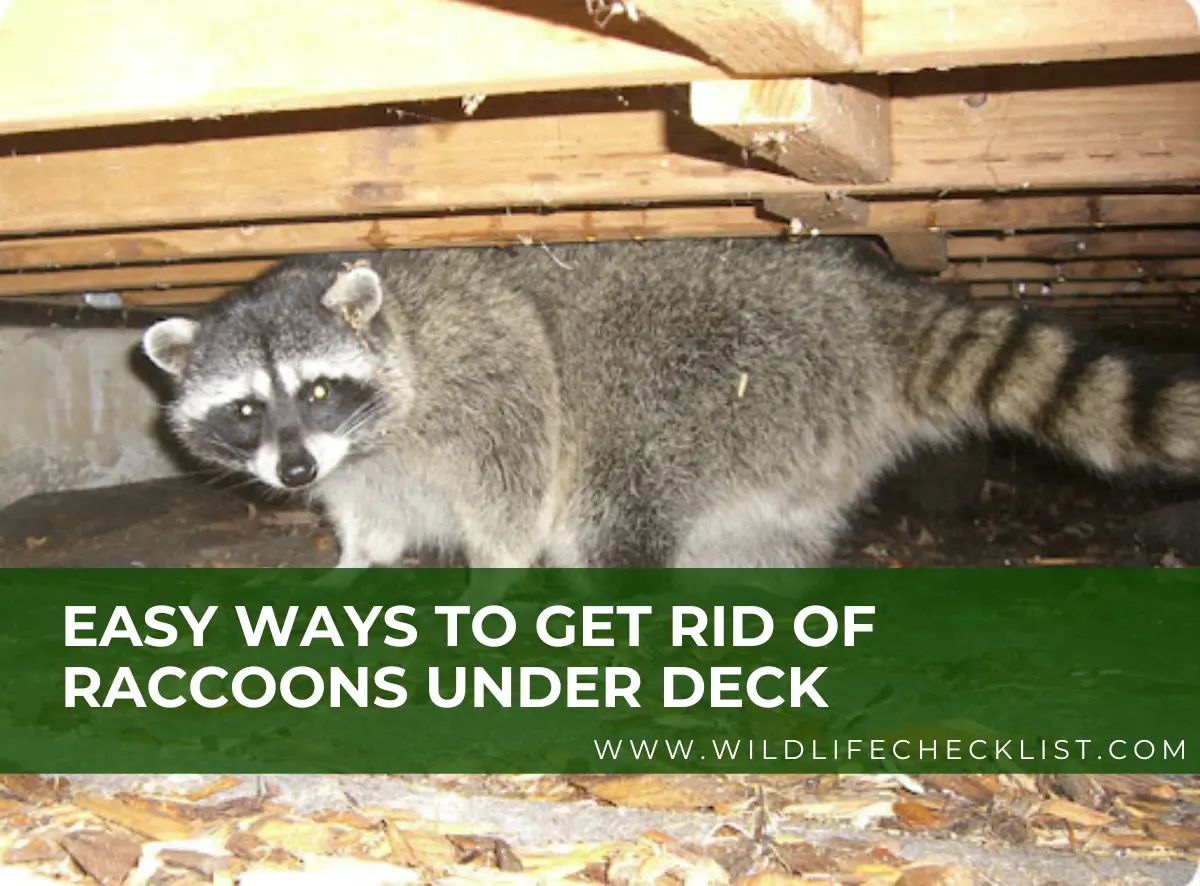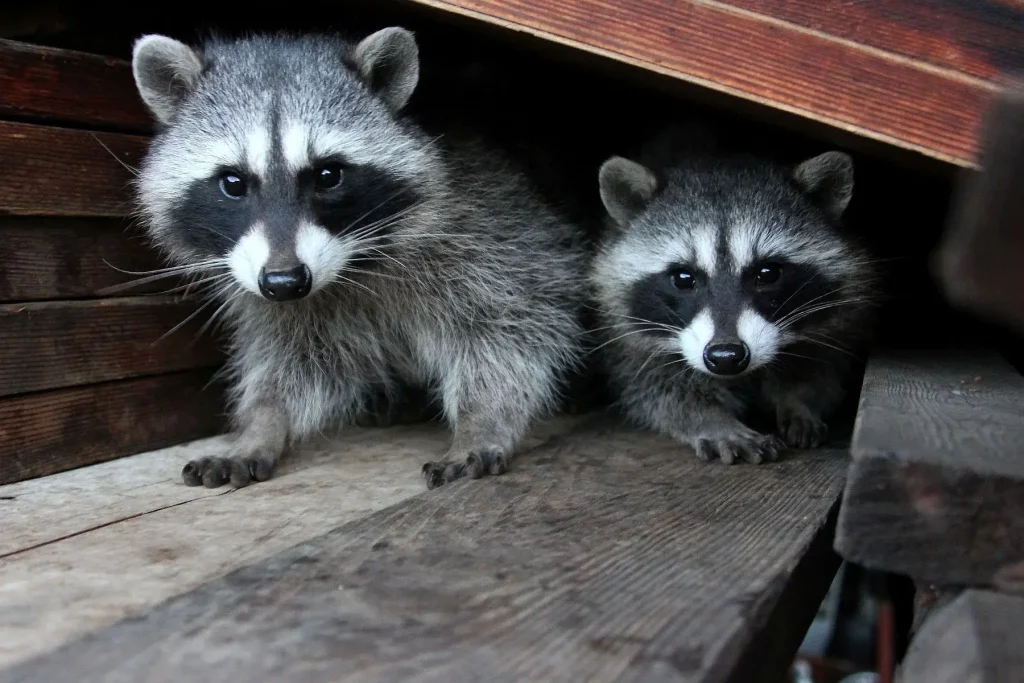4 Easy Ways to Get Rid of Raccoons Under Deck

Understanding how to get rid of raccoons living under your deck or within your property can be a major challenge to people in this category. Do you know that urban centers now allow about twenty times more raccoons than they did in the last five decades ago? These nocturnal scavengers have a voracious appetite and will feed on almost anything, making various homes an easy target.
They wreak havoc on garbage bins, crops, and gardens, devouring nuts, fruits, eggs, seafood, frogs, insects, larvae, and snails. Raccoons under your deck can tip over trash cans and cause damage by digging up your yard, among other disturbances.
You may have been going through the challenges of raccoon invasion, and thinking on the most effective way to get rid of them. However, removing raccoons should be approached with caution to reduce damages to both your property and the animals.
Contents
What You Should Know Before Getting Rid of Raccoons Under Deck
The scientific name for raccoons is Procyon lotor. These creatures are known for their intelligence, adaptability, and heightened sensory abilities, particularly in terms of touch and hearing, as well as their acute sense of smell.
Raccoons love to seek shelter in a variety of locations such as decks, chimneys, trees, sheds, sewers, backyards, caves, attics, abandoned buildings, or vehicles. They may inhabit multiple dens at the same time, often numbering around 20, to ensure they have access to food, water, and refuge.
In addition to residential areas, raccoons love to live in diverse environments including freshwater and saltwater marshes, farmlands, floodplain forests, and hardwood swamps.
Their lifespan in the wild on the average is about three to five years, although when in captivity or safer environments, they can live for twenty years or more. In urban settings, raccoons can maintain territories approximately 0.1 square kilometers in size.
How to Get Rid of Raccoons Under Deck
1. Use Sound or Noise
Raccoons are known to be nocturnal creatures, and can be deterred by sudden or loud sounds. Experiment with techniques like clapping your hands, banging pots and pans, or playing loud music on a radio to displease them.
2. Clear all food sources
Raccoons are drawn to sources of food such as trash bins, bird feeders, and pet food left outside. Make sure these items are securely stored and not made accessible to raccoons.
3. Use Repellents
There are different natural and commercial deterrents that can be effectively used to discourage raccoons, including substances like ammonia, vinegar, or predator urine. You can spray them along the edges of your deck or apply it to the particular spots where raccoons are often seen.
4. Install Barriers
If it is feasible, consider erecting some barriers along the edges of your deck to stop raccoons from entering. There are different options you can try out, like wire mesh or fencing, and it can be fixed into a depth of at least one foot into the ground. This can effectively deter raccoons from digging underneath and gaining access.
Why You Should Remove Raccoons
You might have a feeling that having raccoons beneath your deck are of less concern compared to having one inside your attic. On a general perspective, there can be less potential damages on the ground compared to the one within your residence.
Nonetheless, it’s important to recognize that a raccoon inhabiting spaces under your deck, porch, or shed can still pose various nuisances, such as:
- Coming to steal the food belonging to dogs, bird seed or other food-related items that you do keep outside your house.
- They can dig up your flower beds and destroy the fruit-bearing trees.
- Raccoons can harass your pets, especially the ones that live outside the house.
- Ripping up insulation from the underside of your porch or deck.
- Foraging through your trash and making a mess of them all.
- Causing different havoc on your deck.
Signs You Have a Raccoon in Your House

In the absence of not directly seeing raccoons in your yard, there are various ways to be sure they are around you. It is better to be very sensitive so that you can plan on what to do, to evict them from your properties.
Below are some of the signs that indicates the presence of raccoons around your house or properties, and immediately you see this signs, it is advisable to start preparing for ways to get rid of raccoons in your deck or yard.
- One of the common method ways to distinguish between different animals is through their excretion. Unlike many other animals, raccoons tend to create communal latrine sites where they consistently pass feces in specific areas, often on flat or raised surfaces such as corners or edges of porches, decks, and sheds. These piled feces of raccoons do resemble that of dogs but can be identified by their darker color, tubular form, and granular texture.
- Noticeable odor of feces or urine
- Raccoons can damage properties, such as to shutters, shingles, vents, or exterior surfaces (Note: Holes in wood can also be a common indications of termite activity in your yard)
- Unusual sounds coming from walls, attic, or crawl spaces, particularly during nighttime.
- Presence of small, hand-shaped tracks
- Disorganized trash cans or scattered debris in your yard.
- Destruction of gardens, bird nests, or agricultural crops.
- Preying on chickens or other poultry animals.
Remember that some of these signs can also be similar to that of an opossum, so it is advisable to seek assistance from a pest control expert to accurately help you determine which pest is active in your yard. Unfortunately, for some homeowners who breed backyard chickens, it’s not uncommon to discover that raccoons have preyed upon their poultry or consumed their eggs overnight.
Regardless of whether you have identified a raccoon issue, it is wise to come up with preventative measures to stop raccoons from effortlessly reaching your chickens, and other domestic animals in your yard.
Anytime you encounter any wildlife like raccoons around your yard, it is wise to act with caution. Raccoons have the potential to transmit diseases and their behavior can become defensive if they feel they are at risk.
If a raccoon has found its way into your yard and you feel uneasy handling the situation alone, find a way to contact a local animal welfare or raccoon removal service to help you find a way to relocate the animal.




